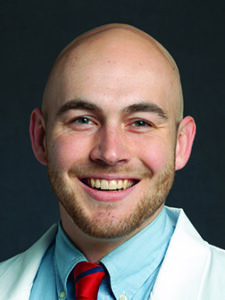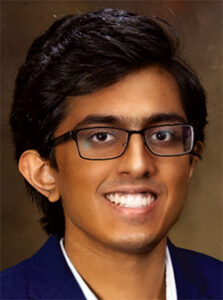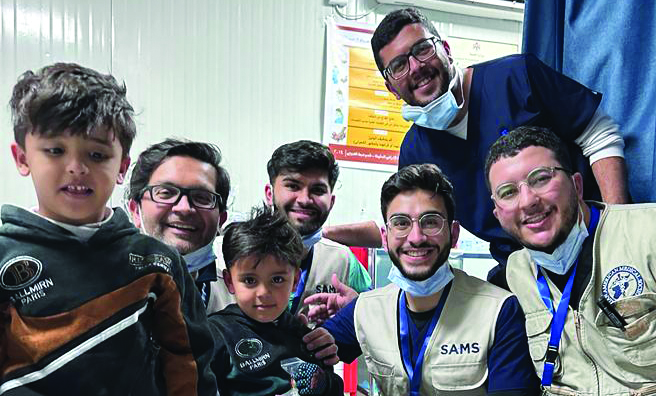New tools in development tackle insurance denials, assist with patient documentation and translation.
Most medical students know, often long before they begin their medical studies, that repetitive administrative tasks will figure prominently in their future careers. They know they will be fighting with insurance companies to cover the lifesaving care their patients need. And they know these burdens drive up rates of depression, burnout, and suicide among physicians.
But some students aren’t willing to accept the status quo—and they’re using artificial intelligence to change it.
“We can leverage technology to make our future work-life balance better,” Maguire Anuszewski ’23 MD’27 says. “We can make physicians’ lives easier so that they can focus on the patient and actually practice the medicine they want to practice.”

Maguire Anuszewski
Anuszewski is a medical consultant for Kyron Medical, a startup founded by two Brown undergraduates that uses AI to automate medical billing, reduce errors, and challenge denials. He says he’s seen firsthand the toll that these problems can take on a physician and their practice.
“Physicians are literally tied to the phone because they’re waiting on hold to get through to the insurance company to fight for their patients,” Anuszewski says. “That’s not the reason you go into medicine.”
Jay Gopal ’25 MD’29, cofounder and CEO of Kyron Medical, says his inspiration for the company came from his experiences shadowing doctors across multiple specialties, followed by interviews with hundreds of health care professionals across the country. “Addressing health insurance denials came up as a major concern among providers, so we knew we could create significant value by addressing this problem,” Gopal says.
About two-thirds of claims denied by insurance companies are never resubmitted, Gopal says, because the process is so laborious—so practices either absorb the cost, or pass it to their patients. “Due to inefficient medical billing processes, it’s estimated that in the US, every year, about $16.3 billion is lost,” he says.
Already Kyron, whose student-led team is advised by numerous medical alumni, faculty, and technology entrepreneurs, has about a dozen physician practices and health systems trying out its software, which Kyron can custom build. The technology, which is based on large language models, tackles both prior authorization denials and claims denials—and helps practices do so more quickly, so they collect insurance payments more promptly.

Jay Gopal
Gopal says Kyron’s long-term vision is to build physician trust with its denial-handling software, and then offer additional tools to conquer other bureaucratic chores. “Kyron’s mission is about fighting physician burnout, not just for revenue cycle management and billing, but also for processes like streamlining physician-patient communication,” he says. “There are easily a thousand tasks where physicians could utilize AI.”
Physicians struggle with administrative hassles even when they volunteer with medical relief trips, as Samer Wahood ’21 MD’26 witnessed when he volunteered as a medical interpreter at a Syrian refugee camp in Jordan last year.
“Documentation there was just horrible,” Wahood says. “There were a lot of discrepancies in how information is inputted. [Doctors] took out weeks of their schedule to be able to be there for the relief trip, and they wanted to take care of patients and not have the same burden of documentation that they have here.”
Daanish Qureshi ’25, who volunteered with Wahood at the refugee camp, grew up watching his dad bring home patient charts to complete every night. Now an applied math-biology and biomedical engineering concentrator, Qureshi wants to create AI tools to “assist health care workers so that their life becomes easier and they can focus on what they love,” he says.
After returning from Jordan in January 2024, the two students brainstormed how they could use technology to address the documentation challenges they’d encountered. “There’s no Arabic or Urdu AI medical scribe out there,” Wahood says—so they decided to build one. Their startup, Sehat Systems, will use a large language model to record doctor-patient conversations and integrate them into the electronic medical record.
The goal, the cofounders say, is not only to streamline individual patient documentation, but to make that data more accessible for public health research. Qureshi notes that up to 100,000 people may be crowded into a single refugee camp, but without consistent data collection, it’s difficult to identify population-wide health problems, let alone implement solutions.
Their app, still in the early stages of development, will also translate Arabic and Urdu into English, and do so “in a way that’s culturally sensitive,” Wahood says. Like many languages, Arabic has numerous dialects, and subtleties may be lost if a translator doesn’t account for regional differences. Wahood and Qureshi plan to line up physicians around the Arabic- and Urdu-speaking worlds to test their prototype and share feedback; so far they’re in discussions with hospitals in Dubai as well as the Syrian American Medical Society, the NGO that organized the medical relief trip to Jordan last year.
“We have people on the ground and teams there where collaboration will be easy,” Qureshi says. Their physician partners can also ensure the prototype is effective and safe for both them and their patients. “AI is not taking over anything. It is there to supplement and assist,” he says. “We’re making it so that it’s easier for physicians to do their job.”
Gopal agrees. He says Kyron will help people tackle their workload more efficiently—not replace them. “First of all, AI isn’t capable of replacing a doctor’s unique expertise,” he says. “And second, we as a company think the best approach is to combine physician judgment and AI tools to drive better outcomes for patients, doctors, and the health care system as a whole.”
Physicians who want to learn more about Kyron Medical may contact Gopal at Jay_Gopal@brown.edu. Collaborators who are interested in Sehat Systems may contact Wahood and Qureshi at sehatsystems@gmail.com.




